Science and the humanities are sometimes seen as unrelated enterprises—but the director and board of advisors of the University of Iowa's Developmental Studies Hybridoma Bank (DSHB) don’t buy it.
The self-funded DSHB, an NIH National Resource housed in the UI Department of Biology, exists to facilitate biomedical research by providing monoclonal antibody samples to cancer researchers at a fraction of the cost of commercial markets. Its director, Carver Professor of Biology David Soll, and the DSHB advisors believe that for scientists to do their best work, they need the ethical grounding and communication skills that humanities education instills.
To ensure that aspiring scientists at the UI are learning from humanities professors at the forefront of research in their disciplines, DSHB funds research awards for humanities faculty in the College of Liberal Arts and Sciences. CLAS administers the grants, including selecting the recipients from among applications.
"We look at this as an investment in the future vitality of the scientific disciplines,” Soll said. “All scientists need the skills that the humanities teach in order to engage in forward-looking, ethical research and to communicate the relevance of their work to society."
The College of Liberal Arts and Sciences has announced the 2018-2019 class of DSHB Faculty Scholars, who are engaged in the type of innovative humanities research envisioned by the DSHB board of advisors:
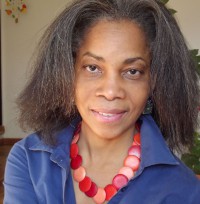 Associate Professor Anny Curtius of the Department of French and Italian will use the DSHB Faculty Scholar Award to pursue her interdisciplinary book project, Unshackling the Memory of Slavery: the Ecodialectics of Landscape and Seascape Memorials. Her book examines memorials grounded in seascape and landscape in the US, the Francophone and Anglophone Caribbean, and Mauritius in the Indian Ocean. These memorials constitute intangible loci of resistance, suffering, and community building, and commemorate transoceanic slave trades and slavery. Informed by postcolonial ecocriticism, trauma theories, memory studies, and post-museology theory, Professor Curtius argues that such monuments encapsulate an entangled history, and also interrogate and challenge the traditional definition of memorials, museums, and archives. She will conduct research at the Memorial ACTe in Guadeloupe, the United Nations in New York, and at UNESCO's archives in Paris where she will consult multimedia records, publications, and correspondence that document the process of listing such sites on UNESCO's World Heritage List.
Associate Professor Anny Curtius of the Department of French and Italian will use the DSHB Faculty Scholar Award to pursue her interdisciplinary book project, Unshackling the Memory of Slavery: the Ecodialectics of Landscape and Seascape Memorials. Her book examines memorials grounded in seascape and landscape in the US, the Francophone and Anglophone Caribbean, and Mauritius in the Indian Ocean. These memorials constitute intangible loci of resistance, suffering, and community building, and commemorate transoceanic slave trades and slavery. Informed by postcolonial ecocriticism, trauma theories, memory studies, and post-museology theory, Professor Curtius argues that such monuments encapsulate an entangled history, and also interrogate and challenge the traditional definition of memorials, museums, and archives. She will conduct research at the Memorial ACTe in Guadeloupe, the United Nations in New York, and at UNESCO's archives in Paris where she will consult multimedia records, publications, and correspondence that document the process of listing such sites on UNESCO's World Heritage List.
.jpg) Associate Professor Roxanna Curto, also of the Department of French and Italian as well as the Department of Spanish and Portuguese, will conduct research for her monograph, Writing Sport: The Stylistics and Politics of Athletic Movement in French and Francophone Literature. The book examines aspects of physical culture in 20th- and 21st-century literature written in French from Europe, North America, Africa and the Caribbean, including texts about the Olympic Games, tennis, the Tour de France, hockey in Canada, Senegalese wrestling, and soccer in France and West Africa. It is the first comprehensive study of the representation of sport and physical culture in literature from the French-speaking world. She will travel to France to visit four key sites: Roland Garros in Paris; the Cycling Museum in Alençon, France; the National Museum of Sport in Nice, France; and the Olympic Museum in Lausanne, Switzerland.
Associate Professor Roxanna Curto, also of the Department of French and Italian as well as the Department of Spanish and Portuguese, will conduct research for her monograph, Writing Sport: The Stylistics and Politics of Athletic Movement in French and Francophone Literature. The book examines aspects of physical culture in 20th- and 21st-century literature written in French from Europe, North America, Africa and the Caribbean, including texts about the Olympic Games, tennis, the Tour de France, hockey in Canada, Senegalese wrestling, and soccer in France and West Africa. It is the first comprehensive study of the representation of sport and physical culture in literature from the French-speaking world. She will travel to France to visit four key sites: Roland Garros in Paris; the Cycling Museum in Alençon, France; the National Museum of Sport in Nice, France; and the Olympic Museum in Lausanne, Switzerland.
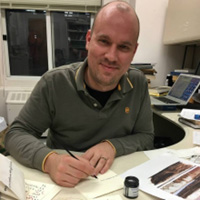 Associate Professor Paul Dilley of the Department of Religious Studies and Department of Classics will conduct research at the University of Hamburg’s (Germany) Centre for Comparative Manuscript Cultures. He will explore possibilities for combining new digital resources in an online edition of the Life of Eupraxia, a fifth-century Greek text about a young aristocratic nun, which provides important evidence for Dilley’s second book project, The Monastic Transformation of Graeco-Roman Popular Theater: A Corpus and Theory of Ancient Christian Comedy. Dilley is producing the first scholarly edition of the book, based on his transcriptions of eight medieval manuscripts, using the latest tools for transcribing, automated collation, and stemmatology (manuscript genealogies). These have never been combined in an online edition, so Dilley will explore best practices for doing so at a prominent international institute for the study of manuscripts.
Associate Professor Paul Dilley of the Department of Religious Studies and Department of Classics will conduct research at the University of Hamburg’s (Germany) Centre for Comparative Manuscript Cultures. He will explore possibilities for combining new digital resources in an online edition of the Life of Eupraxia, a fifth-century Greek text about a young aristocratic nun, which provides important evidence for Dilley’s second book project, The Monastic Transformation of Graeco-Roman Popular Theater: A Corpus and Theory of Ancient Christian Comedy. Dilley is producing the first scholarly edition of the book, based on his transcriptions of eight medieval manuscripts, using the latest tools for transcribing, automated collation, and stemmatology (manuscript genealogies). These have never been combined in an online edition, so Dilley will explore best practices for doing so at a prominent international institute for the study of manuscripts.
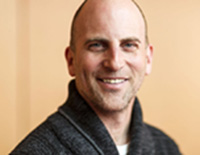 Associate Professor Paul Kalina of the Department of Theatre Arts will use the award to continue his research of integrating the newest digital technologies with traditional analog European clown routines resulting in a first of its kind live Digital Media Clown show tentatively titled Media Clown. Professor Kalina and his University of Iowa partners will travel to the United Kingdom in May for three weeks to complete the second stage of research with their collaborators at Backstage Academy. Both teams will then present the-work-in-progress at the Prague Quadrennial (PQ) of Performance Design and Space, the largest international exhibition and festival event dedicated to scenography, performance design, and theatre architecture. The Festival will provide the team critical feedback from an international audience of industry leaders in order to advance the research to a fully formed touring performance.
Associate Professor Paul Kalina of the Department of Theatre Arts will use the award to continue his research of integrating the newest digital technologies with traditional analog European clown routines resulting in a first of its kind live Digital Media Clown show tentatively titled Media Clown. Professor Kalina and his University of Iowa partners will travel to the United Kingdom in May for three weeks to complete the second stage of research with their collaborators at Backstage Academy. Both teams will then present the-work-in-progress at the Prague Quadrennial (PQ) of Performance Design and Space, the largest international exhibition and festival event dedicated to scenography, performance design, and theatre architecture. The Festival will provide the team critical feedback from an international audience of industry leaders in order to advance the research to a fully formed touring performance.
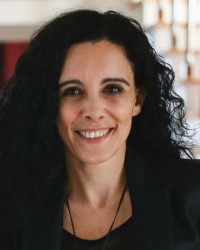 Associate Professor Ana Rodríguez-Rodríguez of the Department of Spanish and Portuguese will conduct archival research for her current book project on Muslim-Christian relations in the Philippines during Spain’s colonial rule of the archipelago (1565-1898), Further Moors: Muslim-Christian encounters on the edge of the Spanish empire. She will travel to the Lilly Library at Indiana University, the Newberry Library in Chicago, and the Hispanic Society of America Library in New York. Her book focuses mainly on the encounter with Islam in the southern islands of Mindanao and Sulu. She analyzes the context of those encounters, the writing mechanisms used to represent the multifaceted contact with Filipino Muslims, and the role of racial and religious difference in Spain’s and other European powers’ cultural production and colonial practices.
Associate Professor Ana Rodríguez-Rodríguez of the Department of Spanish and Portuguese will conduct archival research for her current book project on Muslim-Christian relations in the Philippines during Spain’s colonial rule of the archipelago (1565-1898), Further Moors: Muslim-Christian encounters on the edge of the Spanish empire. She will travel to the Lilly Library at Indiana University, the Newberry Library in Chicago, and the Hispanic Society of America Library in New York. Her book focuses mainly on the encounter with Islam in the southern islands of Mindanao and Sulu. She analyzes the context of those encounters, the writing mechanisms used to represent the multifaceted contact with Filipino Muslims, and the role of racial and religious difference in Spain’s and other European powers’ cultural production and colonial practices.
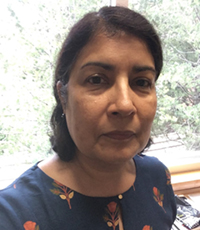 Associate Professor Sujatha Sosale of the School of Journalism and Mass Communication will conduct research for her book project examining the transformation of the lives of tribal communities in North Karnataka, India, in response to relatively recent introductions of media—specifically television and mobile phones—over the last twenty years. Building on theories of the media technology-society relationship, and employing fieldwork and oral history methods, the objective of the study is to learn from community members whether and how these media are integrated into the daily life stream, and to what extent the absorption of these media over time has contributed to changes in their self-defined quality of life. The findings will be shared with community members and could contribute to insights for more planned uses of media for change in the communities, by the communities.
Associate Professor Sujatha Sosale of the School of Journalism and Mass Communication will conduct research for her book project examining the transformation of the lives of tribal communities in North Karnataka, India, in response to relatively recent introductions of media—specifically television and mobile phones—over the last twenty years. Building on theories of the media technology-society relationship, and employing fieldwork and oral history methods, the objective of the study is to learn from community members whether and how these media are integrated into the daily life stream, and to what extent the absorption of these media over time has contributed to changes in their self-defined quality of life. The findings will be shared with community members and could contribute to insights for more planned uses of media for change in the communities, by the communities.